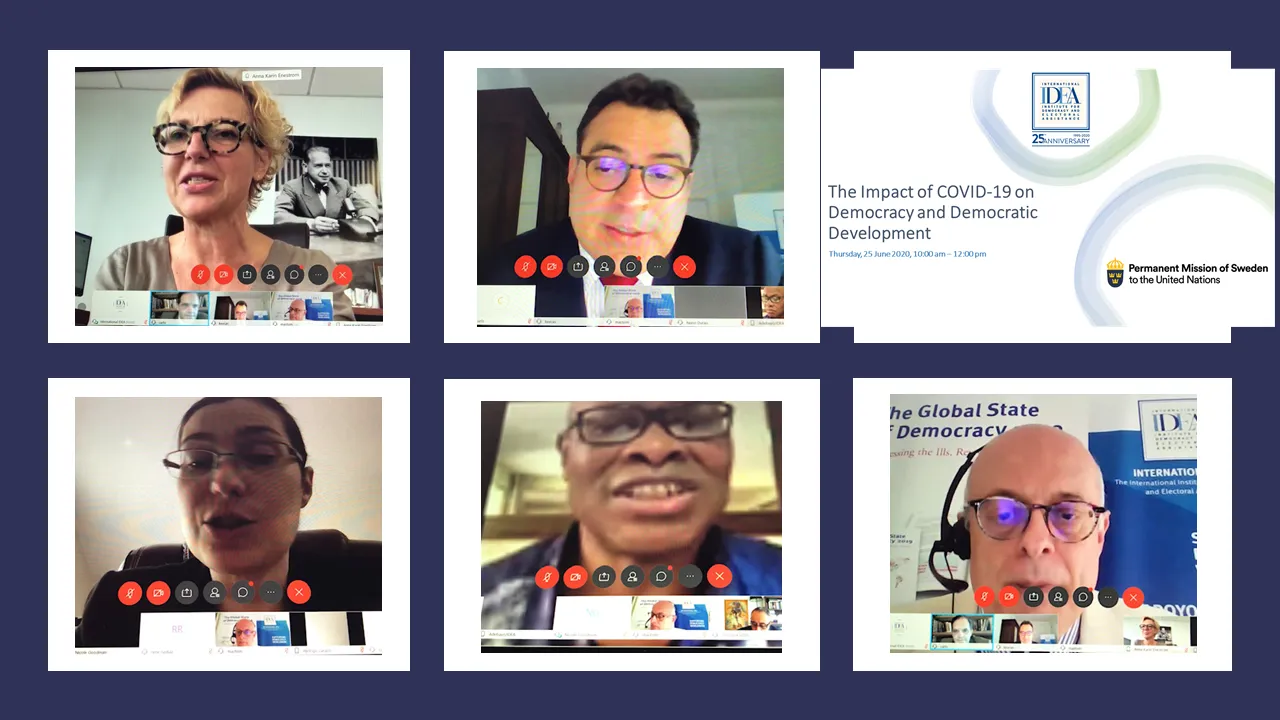Virtual Briefing on the Impact of COVID-19 on Democracy and Development

The International Institute for Democracy and Electoral Assistance (International IDEA) and the Permanent Mission of Sweden to the United Nations, organized a virtual briefing on "The Impact of COVID-19 on Democracy and Democratic Development”, held on Thursday, 25 June 2020 at 10:00 EST.
The online conversation aimed at discussing the implications of COVID-19 on democracy and democratic sustainability and provided a space for analyzing current trends in multilateral and national responses and recommendations on how to integrate a democratic governance perspective in international action. The briefing encompassed a global overview of the trends of the implications of the pandemic to democratic sustainability, and the conversation included two deep dives—one into Africa as a region and one into e-governance and digitalization as a theme.
The Permanent Representative of Sweden to the United Nations, Ambassador Anna Karin Eneström, delivered opening remarks, highlighting the importance of supporting democracy and good governance for comprehensive decision-making and implementation of proportionate actions to address the pandemic, based on grounds of cooperation and guided by multilateral responses to the social, economic and political issues that are exacerbated by COVID-19, adapted to specific contexts worldwide.
The Secretary-General of International IDEA, Dr Kevin Casas-Zamora, provided an overview of the current global trends, highlighting three key messages:
- This crisis is already rendering evident the frailty of democratic institutions in many places and the risks involved in all this for democracy, therefore the need to support and promote democracy now more than ever;
- The crucial question is not what kind of government a country has, but how much government it has. The discussion should therefore be about state capacity and the ability of government institutions to act with efficacy, which is the political cleavage that really matters; and
- This crisis is revealing the social, economic and political fault-lines affecting societies. Many countries will have to go back to the drawing board and renegotiate the social contract, the distribution of burdens between groups, the relationship between societies, states and markets.
Dr Adebayo Olokushi, Director of the Africa and West Asia Regional Office of International IDEA, focused on current challenges and opportunities in the African context. He stressed that growing poverty trends and escalating levels of inequalities are exacerbating the impact of COVID-19 in the continent, and that African conflict and peace dynamics characterize the pandemic as a crisis within a complex of crises, thus magnifying pre-existing governance challenges in the region, like the tendencies to amending constitutions in order to remove limitations on terms, increasing intolerance of the opposition and independent civil society voices, and enforcing restrictive measures that negatively on human rights. Professor Nicole Goodman, Member of the Board of Advisers of the Institute, shared her thoughts about e-governance and digitalization in the current context, including implications to online voting and virtual decision-making, political participation through virtual means and building trust in political institutions, among others. Dr Massimo Tommasoli, Permanent Observer for International IDEA to the UN, moderated the conversation.
The meeting was held following the Chatham House rule, and counted with the participation of Representatives of International IDEA’s Member and Observer States, including Cabo Verde, Chile, Costa Rica, Denmark, Dominican Republic, Finland, Germany, India, Japan, Mexico, Mongolia, Norway, Peru, Portugal, Sweden and the European Union.




